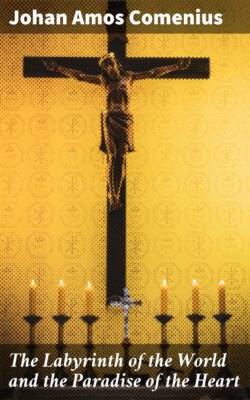Читать книгу The Labyrinth of the World and the Paradise of the Heart - Johan Amos Comenius - Страница 10
На сайте Литреса книга снята с продажи.
CHAPTER V
ОглавлениеTable of Contents
CHAPTER V
THE PILGRIM VIEWS THE WORLD FROM ON HIGH
(There is Nothing beyong the World.)
While I am thus reflecting, behold, we find ourselves (I know not how) on a very high tower, and it seemed to me that I was immediately under the clouds. Gazing down from here, I see on the earth a town seemingly fine and beautiful, and very broad, but I could in every direction perceive its boundaries and limits. And it was built in the shape of a circle, and provided with walls and ramparts; and instead of a ditch there was a dark, deep valley, which, as it seemed to me, had neither banks nor bottom. For only above the city was there light; everywhere around it there was sheer darkness.
(The Situation of the World.)
2. Now I saw that the city itself was divided into countless streets, squares, houses, bigger and smaller buildings; and it was crowded with people as if with insects. To the east I saw a kind of gateway, from which a narrow street led to another gate that looked westward. From the second gate only one entered into the various streets of the city. I counted six principal streets all running from east to west side by side, and in the centre of them there was a large, round square or market-place; behind it there stood to the west, on a rocky, abrupt hillock, a high and splendid castle, at which almost all the inhabitants of the town gazed.
(The Gate of Entrance and the Gate of Separation.)
3. And my guide, Impudence, said to me: "Here, pilgrim, thou hast this dear world which thou wast so desirous to behold. I have, therefore, first led thee to this height that thou mayest gaze on the whole world, and understand its order. That eastern gate is the gate of life, through which all pass who come to live in the world. That second gate is the gate of separation, whence each person, according to the lot he draws, betakes himself to this or that calling.
(The Conditions of Life are divided into Six Orders.)
4. "The streets, then, which thou beholdest are the various estates, orders, and avocations which men choose. Thou seest six principal streets. In this one to the south those who belong to the state of domestic life reside—parents, children, and servants. In the next street live the tradesmen and all who are busied in commerce. In that third street, which is nearest the market-place, live the learned men, who are employed on the works of the mind. On the other side, again, is the order of the clergy, by means of whom others avoid practising religion. Behind them is the order of the magistrates and rulers of the world. At last, to the north, we find the order of knighthood, which is employed in all the arts of war. And oh, how noble this is! These beget all; these feed all; these teach all; these pray for all; these judge all and preserve them from disorders; these fight for all; and all these serve each other, and all have equal rights.
(The Castle of Fortune. The Market-place and the Castle of the World.)
5. "Then that castle to the west is Arx Fortunæ, the castle of Fortune, in which chosen people live, who there enjoy riches, pleasure, and glory. The central market-place is for all; for here men of all classes meet, and discuss what is necessary. In the middle of the market-place is, as it were, the centre of everything—that is the residence of Wisdom, the queen of the world."
(The Beginning of the Confusion.)
6. And this good order pleased me, and I began to praise God that He had so nobly divided the estates of men. But what pleased me not was that I saw that these streets were broken through in many places, so that sometimes one ran into another, and this seemed to me a token that confusion and error might easily happen. Also when I looked at the roundness of the globe, I clearly saw that it moved and turned as in a circle, so that I feared lest I should become giddy. For when I cast my eyes here and there, I saw that in every direction everything swarmed with men. When I inclined my ears, everything was full of knocking, stamping, scrubbing, whispering, and screaming.
(There was Deceit also.)
7. And my interpreter, Falsehood, said: "Thou seest, dear friend, how delightful this world is, and how everything in it is noble; and that, even when thou viewest it from afar. What, then, wilt thou say later when thou beholdest it clearly with its delight. And to whom would it not be pleasant to be in the world?" I said, "Viewed from a distance, it pleases me; I know not how it will be later." "Well, in every way," he said; "only trust me, and we will go hence."
(The Fashion of the Life of Childhood.)
Impudence said: "Wait, I will also show him that spot to which we shall not come afterwards. Look, then, backwards towards sunrise; dost thou not see that something crawleth through that dark gate and creepeth towards us?" "I see it," I said. And he again: "These are people who—whence they themselves know not—have newly arrived in the world; neither do they as yet know that they are human beings; therefore darkness is around them, and naught but moaning and crying. But while they go along this street, grey light and dawn slowly come to them, till they come to that gate beneath us. Let us go on and see what is doing there."
